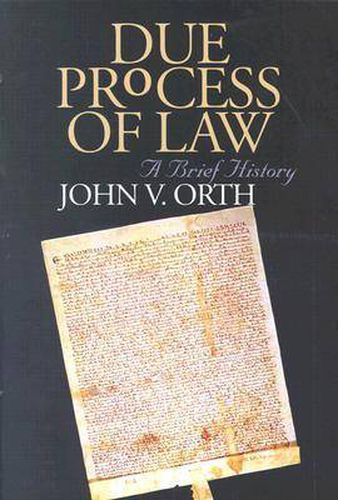Readings Newsletter
Become a Readings Member to make your shopping experience even easier.
Sign in or sign up for free!
You’re not far away from qualifying for FREE standard shipping within Australia
You’ve qualified for FREE standard shipping within Australia
The cart is loading…






Many rights that Americans cherish today go unmentioned in the U.S. Constitution. Where do these freedoms come from? John V. Orth answers that question in this unique and gem-like history of due process. No person’s life, liberty, or property may be taken without due process of law. What exactly that means has been one of the most frequently asked questions in American constitutional history. Today, the answer is usually given in two parts: what procedures the government must follows and - in exceptional cases - what the government cannot do even if it follows the proper procedures. The procedural aspect of this answer has been far less controversial than substantive due process, which at one time limited government regulation of business and today forbids the states from outlawing abortions. Due process of law, as a phrase and as a concept, was already old at the time it was adopted by American constitution-writers, both state and federal. Mindful of the English background and of constitutional developments in the several states, Orth in a succinct and readable narrative traces the history of due process, from its origins in medieval England to its applications in the latest
$9.00 standard shipping within Australia
FREE standard shipping within Australia for orders over $100.00
Express & International shipping calculated at checkout
Many rights that Americans cherish today go unmentioned in the U.S. Constitution. Where do these freedoms come from? John V. Orth answers that question in this unique and gem-like history of due process. No person’s life, liberty, or property may be taken without due process of law. What exactly that means has been one of the most frequently asked questions in American constitutional history. Today, the answer is usually given in two parts: what procedures the government must follows and - in exceptional cases - what the government cannot do even if it follows the proper procedures. The procedural aspect of this answer has been far less controversial than substantive due process, which at one time limited government regulation of business and today forbids the states from outlawing abortions. Due process of law, as a phrase and as a concept, was already old at the time it was adopted by American constitution-writers, both state and federal. Mindful of the English background and of constitutional developments in the several states, Orth in a succinct and readable narrative traces the history of due process, from its origins in medieval England to its applications in the latest